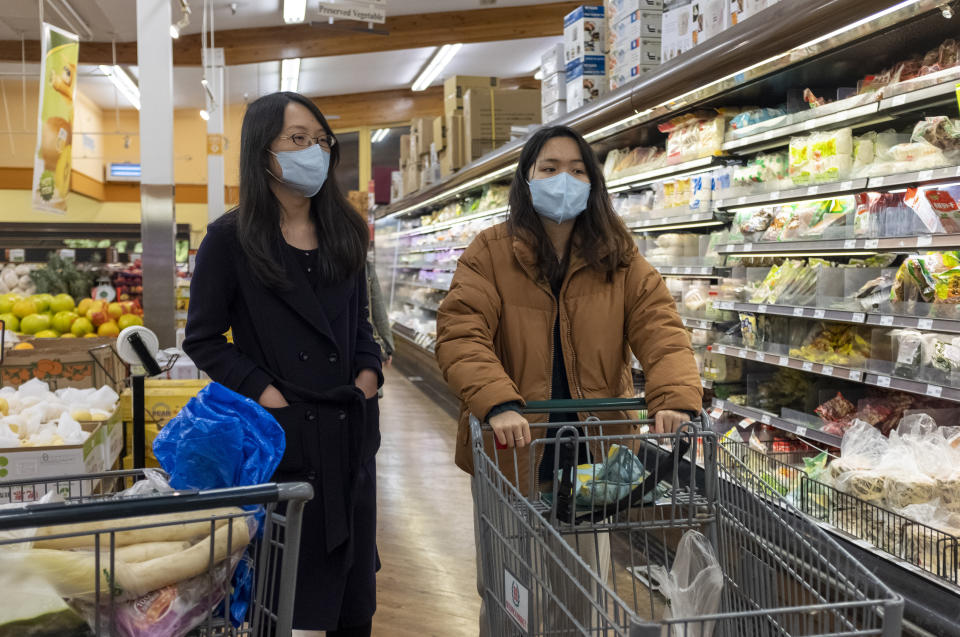There’s a run on surgical masks despite ‘no data’ showing they prevent coronavirus
Editor’s note: On Nov. 10, 2020, the Centers for Disease Control and Prevention (CDC) issued new guidance indicating that masks can protect both wearers and those around them from coronavirus.
Fear of being infected by the Wuhan coronavirus is pushing people around the globe to purchase surgical face masks to protect themselves. And demand for the products has reached such a fever pitch that Home Depot is now limiting sales of masks to customers.
But simple surgical masks won't prevent wearers from being infected by the virus, which has infected thousands in China, killed over 200 people, and spread to 18 other countries including the U.S. If anything, those who are already infected should be wearing the masks.
"We know that those types of surgical masks are important to prevent transmission from someone with infection to other people, and that's pretty routine practice for infections that are spread by respiratory droplets like viruses," explained Dr. Jeffrey D. Klausner, professor of medicine and public health at the David Geffen School of Medicine at UCLA.

"However, there is no data to suggest that in people who are not infected that they provide any protection to prevent infection, to prevent exposure in terms of the typical surgical type mask," he added.
But that isn't stopping people from buying up masks at such a rapid pace that manufacturers have had to increase global production to keep up.
Retailers limiting sales
The coronavirus has now infected roughly 9,800 people, and has led to the lockdown of millions of residents around the epicenter of the outbreak in Wuhan, China. And while cases in the U.S. are still limited to the single digits, Americans are driving a run on face masks.
"In the U.S., we are seeing increased demand for face masks and have limited purchase quantity to 10 per person to best serve as many customers as possible," a spokesperson for Home Depot (HD) told Yahoo Finance. "And our merchandising and supply chain teams are working hard to replenish these items as quickly as possible."
At Walgreens, there's been greater demand for items including face masks and hand sanitizer.
"We continually and closely monitor these types of situations to ensure that we have sufficient supply of those products that may be in greater demand in order to meet the needs of our customers," a spokesperson told Yahoo Finance.
Meanwhile, 3M (MMM) and Honeywell (HON), which make face masks, are increasing output of masks to keep up with demand.

"3M is increasing global production of respiratory protection products as quickly as possible in response to the coronavirus (2019-nCoV) outbreak," the company said in a statement. "In China and around the world, 3M is working with customers, distributors, government and medical officials to help get supplies where they are needed."
Honeywell, meanwhile said it is seeing increased demand for protective face masks in North America, Europe, and China.
"We are increasing production at multiple facilities globally, and we are working to fill all current orders," Honeywell's Eric Krantz told Yahoo Finance. "In China, our products are available from JD.com and TMALL.com, and in the U.S. and Europe, they can be found at a number of retailers, including Amazon."
Most masks won't prevent coronavirus infection
It makes sense that those afraid of contracting the virus would want to take preventative measures to keep themselves safe. But, unfortunately, most face masks won't protect you against the virus.
In other words, the masks will prevent you from spreading coronavirus to other people, but it won't prevent you from catching it.
"The viruses are too small, and the air readily flows around the bridge of the nose and on the sides of the mask," Klausner explained. "So those masks are not really designed to prevent people from inhaling viruses. What they are designed to do is to prevent people from coughing or sneezing respiratory viruses that they might have outward."
It's important to note, Klausner explained, that the coronavirus is a respiratory virus, not an airborne illness like, say, measles, which can linger in an area for some time.
In order for someone to pass coronavirus to another person, the infected individual would need to cough or sneeze near the uninfected person. Those respiratory droplets, as Klausner called them, can then float toward anyone within a 3- to 6-foot dispersal area, before quickly falling to the ground.

There are some masks that can prevent people from catching coronavirus and other respiratory illnesses, though. There’s evidence to show that respirators, such as those with an N95 rating, can be effective, Klausner said. But they're also uncomfortable to wear for a very long time.
There could be some good to more people wearing face masks, however. According to Klausner, the uptick in awareness of the virus could lead more people to wash their hands, and avoid touching their eyes, nose, and mouth. And that may be among the most effective means of prevention available.
More from Dan:
Microsoft Q2 earnings: Beats on top and bottom line on strength of cloud
Apple earnings: Sales beat expectations led by iPhone and wearables
Got a tip? Email Daniel Howley at [email protected] or [email protected], and follow him on Twitter at @DanielHowley.
Follow Yahoo Finance on Twitter, Facebook, Instagram, Flipboard, SmartNews, LinkedIn, YouTube, and reddit.
